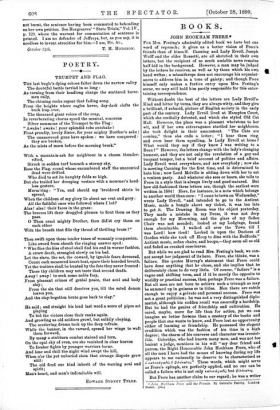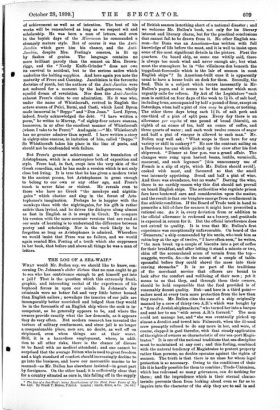BOOKS.
JOHN HOOKHAM FREREA FOR Mrs. Festing's admirably edited book we have but one word of reproach; it gives us a better vision of Frere's friends than of himself. Canning and Lady Erroll, Joseph Wolff and the elder Rossetti, are all sketched in their own letters, but the recipient of so much amiable news remains half-hid in the background. However, a man may be jadged by the letters he receives, as well as by those which his own hand writes; a misanthrope does not encourage his acquaint- ances to address him in a tone of gaiety; and though Frere himself only makes a furtive entry upon Mrs. Festing's scene, we may still hold him partly responsible for this enter- taining correspondence.
Without doubt the best of the letters are Lady Erroll's. Kind and bitter by turns, they are always witty, and they give a brilliant, if subacid, picture of English society in the early part of the century. Lady Erroll lived at Hampton Court, which she cordially detested, and which she styled Old Cat Hall. However, the place was a pleasant whetstone to her wit, and if her own extravagance startled her neighbours, she took delight in their amazement. " The Cats are coming," thus she ends a letter ; "I hear them ring, and even hear them squalling, Is Lady Erroll at home ? What would they say if they knew I was writing to a Beau ? " However, the letters change with the lady's changing humour, and they are not only the revelation of a gay and buoyant temper, but a brief account of politics and affairs. Lady Erroll went everywhere, and saw everybody ; now she is meeting Canning for the first time, and is determined to hate him ; now Lord Melville is sitting down with her to eat a venison pasty. And whatever she sees or hears, she tells to Frere in a style that is always lively and good-natured. But how old.fashioned these letters are, though the earliest were written in 1804! Here, for instance, is a note which belongs to another world than ours "I came to town on Wednesday," wrote Lady Erroll, "and intended to go to the Antient Music, made a bungle about my ticket, it was too late to get it. The Drawing Room was the object yesterday. They made a mistake in my Dress, it was not deep enough for my Mourning, and the glass of my Sedan Chair was not mended ; looked at my Lodgings, found them abominable. I walked all over the Town till I was Lord ! how tired ! Looked in upon the Duchess of Gordon while she took off Hoop to dine with the Bedfords." Antient music, sedan chairs, and hoops,—they seem all as old and faded as crushed rose-leaves.
Bat while we are glad to read Mrs. Festing's book, we can- not accept her judgment of its hero. Frere, she thinks, was a failure. She quotes Murray's statement that Frere could have done anything that he chose, and she implies that he deliberately chose to do very little. Of course, "failure" is a vague and shifting term, and if it be merely ihe opposite to worldly or practical success, then perhaps Frere was a failure. But all men are not born to achieve such a triumph as may be summed up in guineas or in titles. Men there are subtle enough to enjoy a private and personal success. Frere was not a great politician ; he was not a very distinguished diplo- matist, although his sudden recall was assuredly a hardship. But he had the genius of friendship and cultivation. tie cared, maybe, more for life than for action, yet we can imagine no better forbune than a mastery of the books and people that one wants to know, and Frere lost no opportunity either of learning or friendship. He possessed the elegant erudition which was the fashion of his time in a high degree ; the charm of his converse and character was irresist- ible. Coleridge, who had known many men, and was not too lenient a judge, mentions in his will "my dear friend and patron, the Right Honourable John Hookham Frere, who of all the men I have had the means of knowing during my life appears to me eminently to deserve to be characterised as xxxozyco3c;; 0?%;cctxoc." These words, which might serve as Frere's epitaph, are perfectly applied, and no one can be called a failure who is not only zeotoxcivatM; bat cp,Oxaml.
But Frere has another claim to our regard; he was a wtiter
2
Juhn Tfol?tham FiTre arid his Friends. By Gabrielle FestIng. London Nisbet. [1114.1 of achievement as well as of intention. The best of his works will be remembered as long as we respect wit and scholarship. He was born a man of letters, and even in the boyish days of the Microcosm he commanded a strangely mature style. But of coarse it was the Anti- Jacobin which gave him his chance, and the Anti- Jacobin, despite Mrs. Festing's censure, is lit up by flashes of genius. The language contains no more brilliant parody than the sonnet on Mrs. Brown- rigge, and the "Needy Knife-Grinder" does not owe its survival to accident, but to the serious satire which underlies the halting sapphics. And here again you note the maturity of Frere and Canning. Jacobinism is the favourite doctrine of youth, but the authors of the Anti-Jacobin were not seduced for a moment by the half-generous, wholly squalid dream of revolution. Nor does the Anti-Jacobin exhaust Frere's claim to our admiration. He it was who, under the name of Whistlecraft, revived in English the octave stanza of Paid, Berni, and Casti, which Lord Byron made immortal in " Beppo " and "Don Juan." Lord Byron, indeed, freely acknowledged the debt. "I have written a poem," he writes to Murray, "of eighty-four octave stanzas, humorous, in or after the excellent manner of Whistlecraft (whom I take to be Frere)." And again :—" Mr. Whistlecraft has no greater admirer than myself. I have written a story in eighty-nine stanzas, in imitation of him, called Beppo." So Whistlecraft takes his place in the line of poets, and should not be confounded with failure.
But Frere's greatest achievement is his translation of Aristophanes, which is a masterpiece both of exposition and style. Frere had, in fact, crept into the very skin of the Greek comedian, and he has made a version which is not only close but living. It is true that he has given a modern twist to the ancient poems, but Aristophanes is great enough to belong to our own or any other age, and Frere's touch is never false or violent. He reveals even to those who have no Greek "the monkeys and nightin- gales " which chatter and sing in the forest of Aria- tophanes's imagination. Perhaps he is happier with the monkeys than with the nightingales, for his gift is rather satiric than lyrical, and he drives the dialogue along almost as fast in English as it is swept in Greek. To compare his version with the more accurate versions that are read at our seats of learning is to understand the difference between poetry and scholarship. Nor is the work likely to be forgotten so long as Aristophanes is admired. Wherefore we would insist that Frere was no failure, and we would again remind Mrs. Festing of a truth which she suppresses in her book, that before and above all things he was a man of letters.







































 Previous page
Previous page